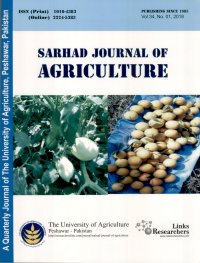Strengths and Weaknesses of Trainings Imparted to Peri-urban Vegetable Growers in the Punjab-Pakistan
Strengths and Weaknesses of Trainings Imparted to Peri-urban Vegetable Growers in the Punjab-Pakistan
Gulfam Hassan1*, Ijaz Ashraf2, Muhammad Qavi Irshad3, Shafiq-ur-Rehman Zia2 and Muhammad Idrees4
ABSTRACT
Balanced human diet is a prerequisite for health and vegetables supply the food nutrients needed for the balanced human diet. More than 36 varieties of vegetables are grown on large scale in Pakistan. Among different provinces of Pakistan, Punjab holds the largest share of 63 and 74% in vegetables’ area and production, respectively. Peri-urban vegetable production is gaining importance in all over the world as it helps the farmers to access inputs and market outputs easily. Lack of sufficient training and low technical efficiency are some common barriers in low productivity of vegetables in Pakistan. This study assesses strengths and weaknesses of trainings conducted by public sector extension in peri-urban areas of Faisalabad, Pakistan. Two hundred and eight vegetable growers were interviewed using a validated and reliable interview schedule. Findings reveal that cooperation of training staff was ranked first followed by use of simple and familiar words during training sessions and provision of timely information in case of strengths of training programs. While looking into weaknesses of trainings, vegetable growers disclosed the unavailability of literature and bad condition of training equipment the top most weaknesses of trainings. On basis of results it is recommended that Extension Field Staff (EFS) should organize more trainings equipped with appropriate literature and skilled trainers for the enhanced awareness.
To share on other social networks, click on any share button. What are these?







